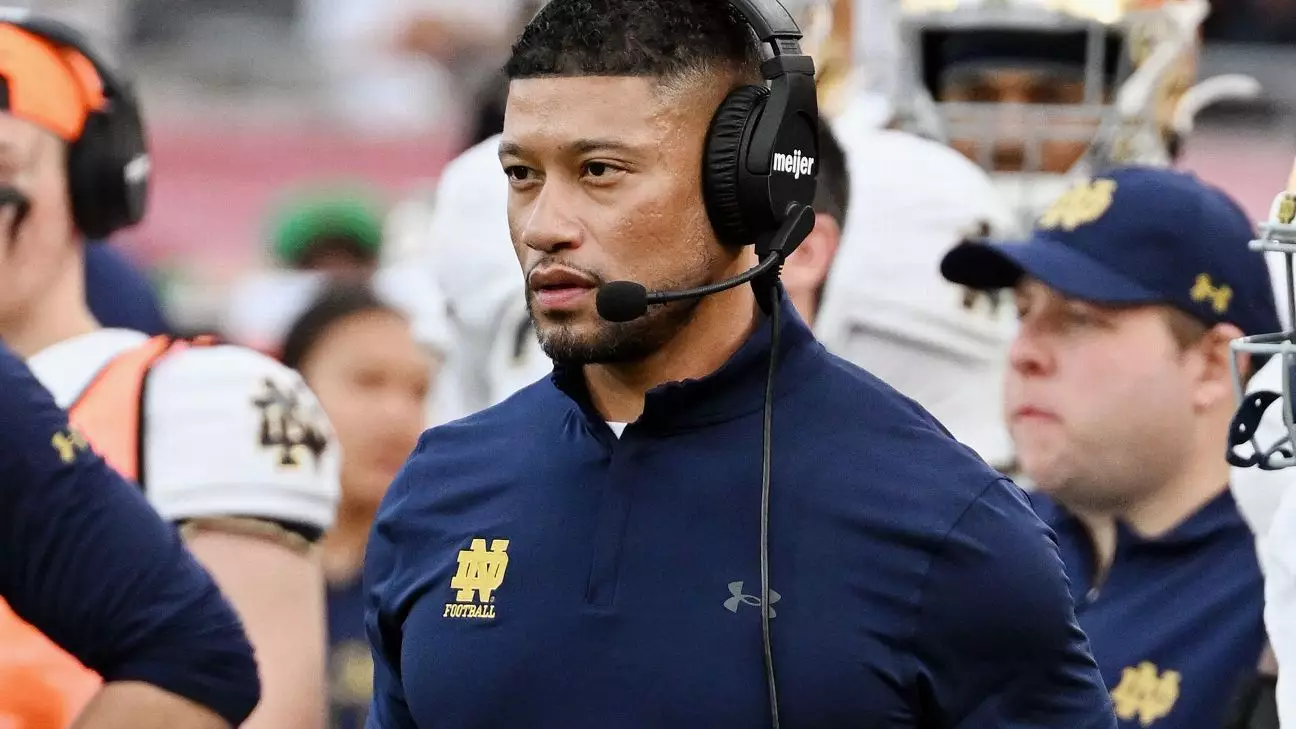The college football landscape is on the verge of a pivotal moment as Marcus Freeman of Notre Dame and James Franklin of Penn State prepare to clash in the Capital One Orange Bowl. The implications of this semifinal go beyond the gridiron, culminating in a potential historical achievement: the winner will be the first Black head coach to guide their team into the national championship game. Both coaches recognize the gravity of this moment, not merely in terms of personal achievement but also its broader impact on the sport.
During their recent press conferences, Franklin drew a powerful parallel between the current context and Super Bowl XLI in 2007, which saw Tony Dungy and Lovie Smith become the first Black head coaches to vie for the championship. At that time, Franklin was immersed in his coaching career, serving as the offensive coordinator for Kansas State under Ron Prince, another Black head coach. Reflecting on that significant moment, Franklin expressed his belief in the importance of representation for aspiring coaches, noting how such milestones can shape the future for others in the profession.
Franklin candidly addressed the changing landscape of college football coaching, highlighting the growth in representation from six Black head coaches in the past to 16 today among the 134 FBS programs. Although some might argue that this number does not indicate rapid growth, he emphasizes that every increase is a step toward greater diversity and opportunity. His acknowledgment of the systemic challenges in the coaching profession illustrates a profound desire for change—one that extends beyond personal accolades.
Marcus Freeman, while recognizing the historical significance of their matchup, also takes pride in his multicultural background as he identifies as half-Korean. This aspect of his identity not only shapes his worldview but also reinforces the message that he embodies for young, aspiring coaches. Freeman’s approach offers a dual perspective: he embraces the opportunity to be a role model while also passionately emphasizing that success is a collective endeavor rather than an individual pursuit.
Freeman articulated the weight of representation, understanding that his position extends beyond himself—he represents countless individuals who share similar backgrounds. His resolve to “work tirelessly to be the best version of me” resonates as he wishes to inspire others to pursue their dreams vigorously. He embodies the notion that limitations should not be self-imposed and that team achievements supersede personal recognition.
Looking Ahead: The Role of Mentorship
Both coaches are aware that their influence can extend beyond their immediate teams and impact the next generation of leaders in college football. Freeman expressed interest in cultivating mentorship opportunities for young coaches, stating the importance of taking meaningful actions post-season to truly assist the upcoming talent in the sport. He recognizes that advocacy requires deliberate choices that not only pave the way for others but also inspire them to take their rightful places in coaching.
Franklin’s sentiment of honor in competing against Freeman reflects a mutual respect that transcends the rivalry—one that is fueled by a shared understanding of the significance of their positions as representatives of diversity within college football. Franklin’s devotion to his team and his desire to champion the players he coaches further indicate his commitment to fostering an environment where all individuals can thrive, irrespective of their backgrounds.
As Freeman and Franklin approach this monumental game, the essence of their historical encounter resonates beyond sports. Each step they take carries the potential of paving the way for future generations of coaches and athletes—especially those of diverse backgrounds who dream of leading teams at the highest levels. Their ability to inspire others while navigating the intersections of personal and professional identities may facilitate significant growth within the coaching landscape of college football.
The upcoming semifinal is not just another game; it is a celebrated moment in history illustrating progress, representation, and enduring hope—qualities that will shape the narratives of countless individuals for years to come.



Leave a Reply